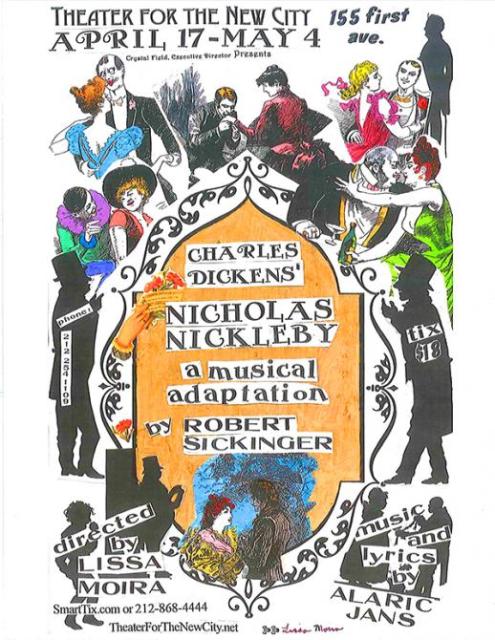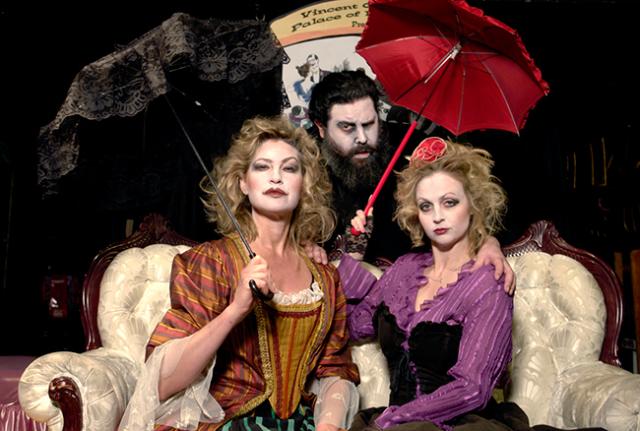

Promises are nothing new in the world of writers ranging from Charles Dickens to Robert Frost – whether they are Frost’s “promises to keep” or Dickens’ promises characters make (and often break) to each other. Promises are also a beautiful way we create bonds to each other and a way the living remain indebted to those who have passed away.
While promises on stage can be inherently dramatic, a new adaptation of Charles Dickens’ “Nicholas Nickleby” is the result of a particularly felicitous vow. Playwright Robert Sickinger’s wife Jo-Ann promised her husband before he died last year that she would see to it that his adaptation of Nickleby got a production. Fortunately, she and Theater for the New City kept that promise. To paraphrase Dickens, seeing this show is … the best of times.
While “Nicholas Nickleby” as a story is no stranger to the stage, we are all the better for the fact that this Nicholas has come to life – or larger than life. The result, a production that just finished an all-too-brief run, is a wonderful vision of a musical based on Dickens’ third novel. In the era of Occupy Wall Street, this Nickleby shows a clash between the upper and lower one percent, the heroic commoner in a society where the odds of success are calculatedly slim. While Nickleby’s life is dreary, the show itself presents every scene with so much joy, there are no dull moments.
This Nickleby with music, lyrics and (in this case) accompaniment by Alaric Jans, is a theatrical triumph. The performances are strong, the staging inspired, the pace swift and the evening memorable (even a matinee felt like a night at the theater). Actors often play multiple roles, creating not just a world but a universe on stage. Scenes are mini-plays and moments in a grander adventure. There is always something happening on stage in a musical circus that director Lissa Moira fills with life and people. Nicholas Nickleby shows us people trapped in the worst of times, but we love seeing them struggle – and sing through it all. Douglas McDonnell as Nicholas moves through this marvelous, musical maze, traveling from innocence to inspiration.
Dickens’ “Nickleby” may be the story of innocence lost (or found), a tome published in installments showing us a boy who finds himself working at Dotheboys Hall, one letter (and not much more) away from hell. This Nickleby, however, tells a big story with many smaller tableaux, much closer to heaven for audiences. Yes, the first act moves faster than the second, which focuses more on tying up loose ends. But even watching those ends tied together becomes an inevitable part of a lovely tapestry. This furious, fun production reminds us why live theater is so memorable. It doesn’t secretly wish to be a movie; it’s a rollicking, theatrical celebration of life. The songs don’t stand out like hits but fit beautifully in place, and the scenes are filled with emotion, enjoyment and amusement. The only mystery to me is why the show hasn’t been more widely recognized and reviewed. The audience was pleased, even if no prominent pens were there to sing the production’s praises. There is nothing grim or dim about the proceedings, which display a Broadway-level craft. Also, both novel and play have a point of view. The common man is hero, while the wealthy relative exploits the world. It’s a simple morality – one that makes up in force what it lacks in nuance. Even the Dickensian melodrama is framed in a modern way that lets us overlook the artifice, because it is a story and a play, not an account of true events. And Theater for the New City, itself a kind of downtown family, is an ideal location to present this work. The show is meant to be a play presented by a theater company mentioned in the actual novel: a mirror in a mirror. We watch the story unfurl on a set framed by pillars like bookends with lighting by Alexander Bartenieff showing the slanted shadows of a huge, expressionistic window: the world dwarves the humans walking through it. People are pawns (tiny beside marble pillars) in a chess game played by powerful people. The show looks at the world through the eyes of rich and poor with the rich as robber barons and the poor, well, as the robbed. David Slone plays Mr. Crummies and Mr. Squeers with the boundless energy of P.T. Barnum. This supreme showman realizes that presenting a Dickens show can be a crowd pleaser and, later, insists they end the story with a Christmas scene – because there is no better ending. Slone speaks each word with the pleasure of someone devouring chocolates slowly, assiduously chewing each syllable, delivering the play as a package. He is the barker in charge of this many-ringed circus and reminding us this is a story without a pretension to be “real life.” Douglas McDonnell’s Nicholas is a dashing, daring lead, naïve and buffeted by the winds of fate. He is a boy who befriends another forlorn boy named Smike, played by Jonathan Fox Powers. Smike, imbued by Powers with a baby face and warm smile, is forever a child, always good even if bad things happen to him. Powers plays a waif (who turns out to be Nickleby’s relative, in the end) naturally, part of a perfect friendship in which Nicholas is the bigger “brother.” Meanwhile, McDonnell is our Virgil in Dickens’ Dante-esque infernal world. He sings beautifully with a pristine, operatic voice and acts convincingly. He is the hero to the foil of William Broderick’s Ralph Nickleby, the rich, unscrupulous relative of the play’s namesake. Broderick, whose visage looks at once ghostly and sculptural, is vintage Dickens, materialism run amok, a headmaster in the school of life. His “Why Do They Always Want What’s Mine?” is an anthem for materialism and narcissism, half Grinch, half greed and all joy in selfishness. Robert Lowell wrote that “selfishness is character in children.” Ralph is a selfish child whose success is due to a single-minded focus and soullessness. When he hears about someone who is unselfish and good, he reminds us dismissively that they are the same thing. He struts and schemes, filled with pride and power, contemptuous of everything and motivated by his own narrow interest. He aggrandizes himself, even and especially at society’s and family’s expense. He sucks the air out of the room, all charm and posture. Like the man so imposing, the head of the table is where he sits, Broderick is big enough to have been borne out of a Dickens book. Wherever he stands on stage, that is the center. When his Ralph Nickleby says at the end that he is “still dead,” we know he is not dead at all – or at least not buried. Or we think he’s archetypal enough to kick off the dirt and knock at our door. When he sings, “How worthless gold and silver, oh what money cannot by,” we are seeing a kind of deathbed conversion. Maybe that revelation’s too neat, but this is from a story with a moral aimed at readers who were, probably, middle class. It isn’t that money is bad; it’s that family matters more. Regardless of the moral message, the musical’s a blast. This play brings Dickens and Sickinger to life in a production that those who love Broadway will love and those who wish it were more intimate will cherish. Lisa Moira’s direction shepherds the show ably, smoothly and sweetly from scene to scene. The children in a boarding school from hell enter, carrying their own chairs, in a beautifully choreographed dance. When they take revenge, pummeling their “captor,” it’s equally well choreographed. If these scenes felt real, they would be violent and even bloody. But we realize we are watching a melodrama the way Dickens lets us know we are reading a story. The evening is a perfect balance of romance and laughter, good and evil, humor and gut-wrenching emotion. It is a visual feast, a parade as much as a play where we keep moving forward to the next big moment. Shakespeare wrote about kings; Dickens wrote about commoners in a way that made them seem kingly. The characters in Moira’s vision exist in gesture, moving across the stage in machinery with many moving parts. In fact, the entire show has been arranged with the love and attention to detail of a dance. There are too many nice touches to detail, though one scene of characters dancing with twins (in creative costumes by Jennifer Anderson) is at once lyrical and hysterical. This doesn’t mean the play is perfect by any means, particularly in terms of plot. It’s full of action. But the first act, which deals with Nicholas’ descent into the netherworld Dickens describes, is by far the strongest. Later, the show shifts more toward romance with a trajectory often aimed toward conclusion. While Shaw wrote about the well-made play, the plot here clearly follows a different aesthetic and storyline than the Shavian sense. Nicholas beats a lout senseless who besmirches his sister’s reputation. We wait for consequences as police pursue him. There is no reckoning or even persecution. After Becka Gottlieb as Fanny Squeers as a spurned woman writes a letter, accusing Nickleby of ravishing her, we expect to see the sky fall again as police chase him. That doesn’t happen. Even her accusatory letter is fun and funny, despite its serious, trumped-up charges. It’s as if Nicholas is immune from consequences while the poor house always awaits, yet never arrives. The play itself becomes episodic in the second act, like Dickens’ own story, based on installments and subplots. The ending, when we find out that Ralph is the father of Nicholas’ often abused and orphaned friend, is artificial and false.
But we forgive Dickens and the play because the story never masquerades as reality. In the end, this is not really a romance with love as salvation. It is a wonderful, trenchant play with a penchant for action, a musical that moves easily from start to finish. Nicholas Nickleby may have visited New York before. But he has never been more full of life, fun and pleasure than in this version.
